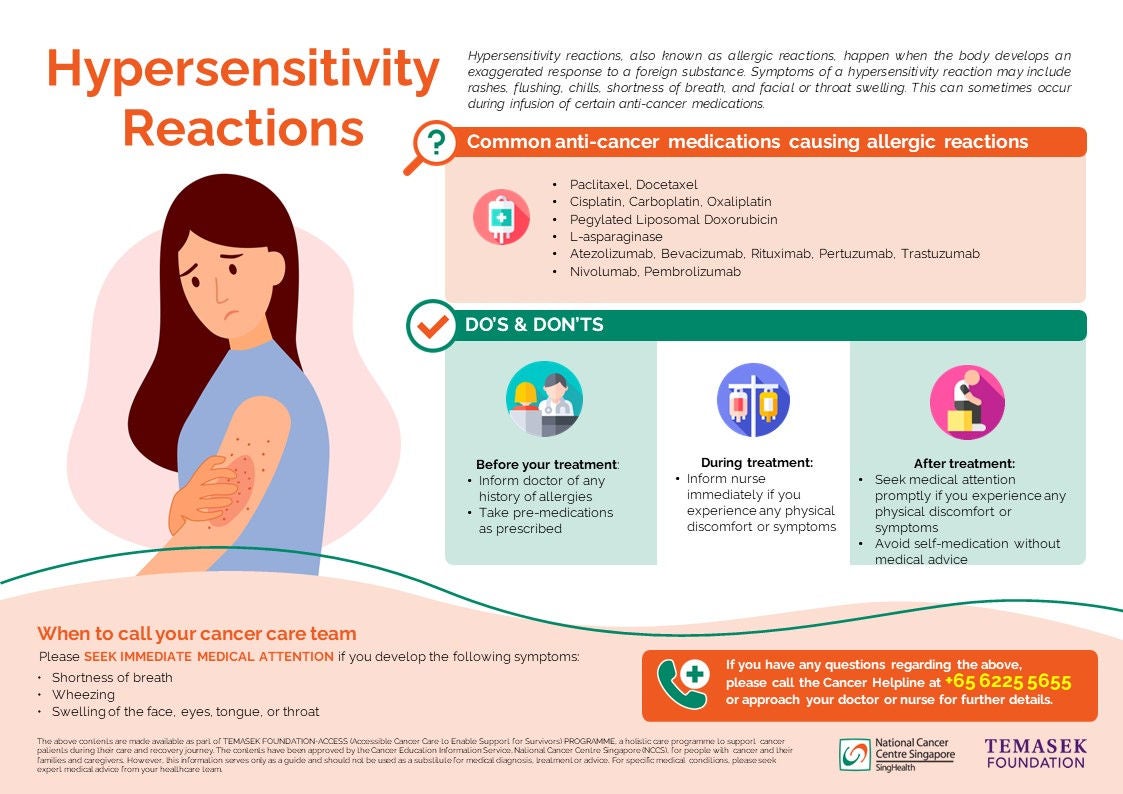National Cancer Centre Singapore will NEVER ask you to transfer money over a call. If in doubt, call the 24/7 ScamShield helpline at 1799, or visit the ScamShield website at www.scamshield.gov.sg.
Allergies
- Allergies
- Appetite Loss
- Bone Problems
- Breathing Problems
- Constipation
- Diarrhoea
- Difficulty Swallowing (Dysphagia)
- Dry Mouth (Xerostomia)
- Difficulty Sleeping (Insomnia)
- Feeling Tired (Fatigue)
- Fevers and Infections
- Hair Loss
- Heart Problems
- Menopausal Symptoms
- Indigestion
- Joint Pains
- Limb Swelling (Lymphedema)
- Muscle Aches
- Nail Changes
- Nausea and Vomiting
- Pain
- Tingling or Numbness in Hands or Feet (Peripheral Neuropathy)
- Skin Changes
- Sore Mouth (Oral Mucositis)
- Taste Changes

Allergic reactions, also known as hypersensitivity reactions, happen when the body develops a set of symptoms in an exaggerated response to a foreign substance (e.g. drug, food, pollen, etc). One of the most common hypersensitivity reactions during the cancer treatment phase happens during infusions of anticancer drugs, when the body reacts to the drug. This write up focuses on allergic reactions related to infusions of anticancer drugs.
Causes of Allergic Reactions
Allergic reactions have been reported with most anticancer drugs, but occur more commonly with the following:
- Paclitaxel, Docetaxel
- Cisplatin, Carboplatin, Oxaliplatin
- Etoposide, Teniposide
- Pegylated Liposomal Doxorubicin
- L-asparaginase
- Rituximab
What you need to look out for
Some allergic reactions may occur immediately upon infusion, while others may take hours to develop. They range from mild to severe. A severe allergic reaction can occur rapidly to affect the whole body, and can be life-threatening if not taken care of immediately.
Mild allergic reactions can present as:
- Skin rashes
- Chills
- Itchy / runny nose
- Mild shortness of breath
- Watery / itchy / red eyes
- Flushing or temporary redness of the face and neck
- Chest tightness
Moderate to severe reactions can present as:
- Nausea / vomiting
- Abdominal cramps
- Swelling of face / eyes / tongue / throat
- Difficulty swallowing
- Wheezing / severe difficulty in breathing
How it can be treated
For anticancer drugs that are known to commonly cause allergic reactions, pre-medications (medications given prior to your anticancer drug infusion) will usually be prescribed to prevent or lessen reactions where needed. However, allergic reactions may still occur, and if they do, a doctor will assess you, determine the severity of the reaction and may do the following:
- Stop the drug infusion. If the reaction settles, the drug infusion may be restarted at a slower rate, but if the reaction is severe, the drug infusion will likely be discontinued permanently.
- Prescribe medications to reduce the effects of the reaction. These can include antihistamines (e.g. benedryl), corticosteroids (e.g. hydrocortisone), and/ or bronchodilators (e.g. salbutamol) to ease any symptoms that you may experience.
- Inform your treating oncologist of the reaction so that future measures can be taken to prevent the allergic reaction from occurring again.
What you can do
The following are some steps you can take to help reduce your risk of allergic reactions from anticancer drug infusions:
Before your treatment
|
|
During treatment
|
|
After treatment
|
|
When to call your cancer care team
Because it can be life-threatening, you are advised to seek emergency help if you experience the following symptoms:
- Difficulty in breathing
- Wheezing
- Swelling of face / eye / tongue / throat
If you are receiving treatment at NCCS Ambulatory Treatment Unit, please contact your nurse chemotherapy educator, or refer to “Your Guide to Chemotherapy Booklet” if you have any questions regarding allergic reactions from your treatment regimen. For all other general enquiries, please call Cancer Helpline at +65 6225 5655 or approach your doctor or nurse for further details.
Click here to download the PDF version of this article.
如果您要下载本文的中文版本,请点击此处。
Klik di sini untuk memuat turun versi PDF artikel ini.
The above contents are made available as part of TEMASEK FOUNDATION-ACCESS (Accessible Cancer Care to Enable Support for Survivors) PROGRAMME, a holistic care programme to support cancer patients during their care and recovery journey.
The contents have been approved by the Cancer Education Information Service, National Cancer Centre Singapore (NCCS), for people with cancer and their families and caregivers. However, this information serves only as a guide and should not be used as a substitute for medical diagnosis, treatment or advice. For specific medical conditions, please seek expert medical advice from your healthcare team.
Brought to you by:
Keep Healthy With
© 2025 SingHealth Group. All Rights Reserved.

















